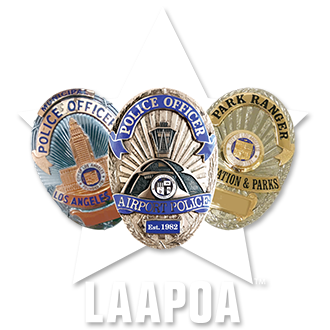A minor incident at Los Angeles International Airport this morning that had a major impact on traffic exemplifies the pitfalls of staffing cuts by the Los Angeles Airport Police Department.
At around 8:30 a.m. LAXPD officers shut down an entrance to LAX after stopping a white truck filled with numerous firearms at a security checkpoint. Officers responding to the scene ultimately determined that the driver was a memorabilia collector and the weapons were inoperable replicas used for reenactments. Fortunately, no laws had been broken, but in the time it took to respond to and resolve the situation, roads around the airport backed up for several miles and traffic was delayed for hours.
“Today’s events demonstrated why the Airport Police should rethink cutting public safety staffing by 20% to save money to repay airport revenue bonds,” LAAPOA President Marshall McClain says. “The lack of resources for this one incident due to these cuts impacted everyone. With proper staffing, situations like this could be resolved much faster and with less impact on the traveling public.”
The cuts show that new LAXPD management lacks true understanding of the unique patterns and specialized needs of aviation law enforcement. Coming from dramatically smaller police agencies — one of which totals only 50 officers — they don’t comprehend the ripple effect that cutting police staffing has on everyone at the airport, as well as the surrounding cities and other law enforcement agencies.
These staffing cuts are short-sighted and unnecessary. Even when the City of Los Angeles was facing possible bankruptcy, then-Mayor Antonio Villaraigosa refused to cut or furlough police, and in fact hired 1,000 more officers. The LAXPD is funded by airport landing fees and has no impact on the City’s general fund. LAX has increased passenger loads by over 25 million passengers over the last five years while undergoing a $15 billion expansion and modernization — factors that call for more police officers, not fewer.
“Public safety needs to be made a priority,” McClain says. “The traveling public cannot afford these continued bad experiments by underqualified police managers making ill-conceived, half-baked decisions that leave our officers hamstrung, doing their best to pick up the pieces without proper staffing, equipment and funding.”

